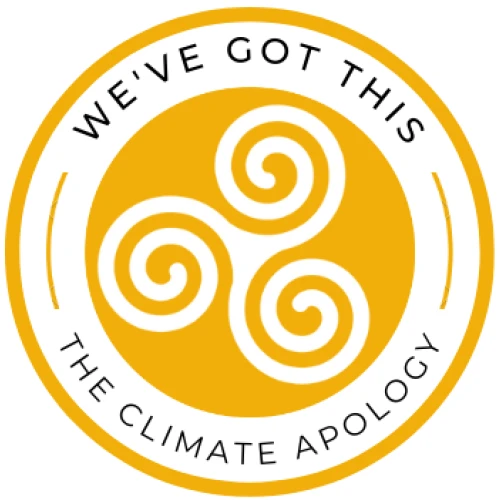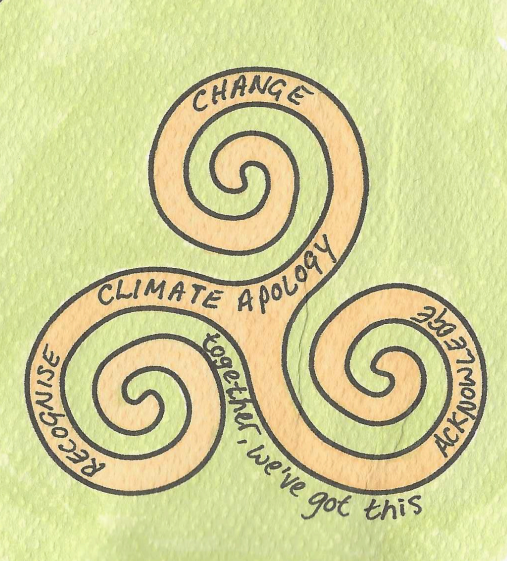Despite our belief to the contrary, we're all pretty similar. When it comes to climate change, most of us deal with it by telling ourselves some version of: it won't be that bad; they'll have found a technological solution by then; my actions make no difference; it's their (read China, India, my neighbours, etc) fault; the bloody politicians should do more; why I should live sustainably when no-one else is; it's my right to choose how I live; or, I deserve to enjoy what I've worked for.
These voices provide the excuses we need to pursue lifestyles that are unsustainable and selfishly put our own interests above those of others, including our loved ones. They make us apathetic about the most urgent crisis we face as individuals.
Internal family systems as a tool to find our motivation
We struggle to find the the motivation in our busy lives to argue against these convincing messages. Identifying and engaging with them as a character makes it easier. This pathway to climate behaviour change is based on Internal Family Systems therapy, developed by American psychotherapist Richard C. Schwartz in the 1980s. IFS helps individuals identify various internal parts and galvanise them into being constructive actors in daily life. It extends on the idea of the inner child, first brought to the west from eastern philosophies by Carl Jung, and it was the idea behind the acclaimed 2015 Pixar cartoon, Inside Out, which enabled children to understand the confusing array of emotions they feel.
Bundled together, the internal messages that discourage us from acting green make up our internal armchair environmentalist. AE for short, it poses alongside AI one of society's greatest challenges. Coming from a long line of armchair politicians, it's a character I'm familiar with. It drip-feeds me these arguments, allowing me to lean back into my comforts and rendering me blind to my own culpability over the last four decades. It lets me off the hook from making inconvenient lifestyle changes.
AE 's goal is not to hurt me. Rather, it tries to protect me from the personal emotional and practical difficulties posed by climate change. By outsourcing responsibility, it pacifies my sense of helplessness and fear in the face of a catastrophe I can now see and feel in my daily life. It's lets me ignore a consumption addiction that seems too entrenched to tackle. It masks the loss I feel at the prospect of changes to the lifestyle and values that I define myself by. In short, it's an internal movie of a great hero swooping in at the last minute to save my loved ones' future which I watch on loop while stuffing popcorn in my mouth.
AE's messages arise from common human responses to perceived threats and desires. We tend to stick to the status quo in the face of change and dissonance; adapt our behaviours according to our misperception of others' behaviour; prefer short rather than long-term gratification, and in fulfilling this preference, are adept at deferring risk. They complement our other internal fears of loss - from loss of our comforts and convenience, to money, identity, status and power. Its messages find fertile ground in our lifestyles and values, shaped by economic and social structures that promote and reinforce our individualism, competitiveness and addiction to consumption.
"Why should I apologise?"
The purpose of an individual climate apology is to bring us face-to face with our AE, which immediately demands, "Why the hell should I apologise and change?" The scientific answer is that we have no choice. Sadly, however, we don't listen to the science. More than four decades of facts and figures and mountains of information hasn't moved us.
The other answer pulls on our heart strings: because we love and are responsible for others in our lives. This response gives voice to another internal part, one that the world's religions and philosophies argue is deeper and stronger than Adam Smith's portrayal of human nature as greedy and competitive. Love, for those around us.
The climate apology turns us away from our own interests towards those of our loved ones. It asks us to recognise the reality facing our loved ones. This requires empathy, a key trait of environmentally friendly behaviours. When we understand that our AE convinces us to behave in ways that run contrary to their interests, we can also turn this empathy inwards. It's not that we are inherently selfish and greedy, but have been out-maneuvered by these internal messages and external realities of jobs, bills, individualism, consumerism and competition.
Seeing someone we love suffer generally provokes a response. We'll offer anything from a hug and word of sympathy through to hefty practical and emotional support because we believe that our actions can help, or at least provide comfort. And so it is with climate change. Basic lifestyle changes (reducing meat and energy use, reassessing mobility choices) and serious acts of citizenry (e.g. voting & responsible banking) are practical, easy steps that can help our loved ones look at their future more hopefully. Regardless of whether you are willing to dwell on your past climate wrong-doings, acknowledging and enacting the power you hold as a loved one and citizen, consumer and social media user, worker and colleague, friend and neighbour is beneficial to your loved ones both in terms of their future climate and their current mental health.
Sorry as a motivational word
The climate apology doesn't aim to accuse or create guilt, but to lead people towards sustainable living by confronting us with our love and responsibility for those in our lives. The world's religions and philosophies have always espoused our interconnectedness as the key to personal fulfillment. Economic models based on well-being and decent living standards do the same. But we find it difficult to find a personal path to this ancient wisdom when it comes to climate change.
That horribly overused word 'sorry' can become a daily trigger to keep drawing on our love to counteract our AE. Stop for a moment; see this as an Opportunity for the future of your loved ones; Reflect on your diverse roles as a consumer and citizen: Reduce and vote for change; and focus on what You can do for Your loved ones. SORRY
Focusing on your own actions in the interests of your loved ones effectively counteracts AE's message that you can do nothing. You might even say sorry to your AE for not listening to it anymore. Saying sorry to ourselves is an expression of empathy for that difficult task of pulling ourselves up out of our comfy, safe armchairs.
As with so many things, the dread of sacrifice and hard work is far worse than the reality. Living sustainably for our loved ones doesn't lead us back to the cave - that's AE talking. Voting for serious climate policies and reducing your consumption of energy and meat changes little in your daily life; it does, however, have a big impact on the family, kinship and social networks to which you belong, all of which are essential parts of the global system requiring urgent mitigation and adaptation action.
And the personal benefits for you? Apart from becoming a great role model for those you love, you might find a gradual reduction in the dissonance created by pretending that everything is OK as climate change unleashes its fury around us. Action is a very effective antidote to climate anxiety. And in the process, you might also find that your armchair environmentalist turns into a determined climate mitigator.
Love, actually
Right now, your AE may well be telling you that this is all wishy-washy, psycho-babble bullshit - an aggressive reaction to a serious challenge. Don't listen. These are the same ancient wisdoms and internal processes of change that have been repackaged and sold to us for billions of dollars as mindfulness, positive thinking and manifestation. If we believe in it when it's packaged for consumption, we can believe in it for the future of our loved ones.
So, draw on that part of yourself that feels love and responsibility for those in your life. This leads us towards fulfilling our responsibility to do all we can to contribute to a livable climate future.
Together, we've got this.

Louise Rapaud
Previous Project
Next Project
